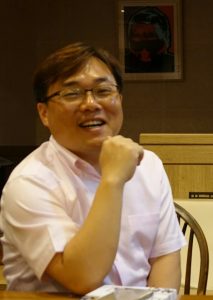Sung Hyun Kang is an Assistant Professor at the Department of International Cultural Studies & Institute for East Asian Studies, SungKongHoe University (Seoul).
Sung Hyun Kang, Assistant Professor at SungKongHoe University
“Transnational Archives: Cold War, Postcolonialism, and Korean Studies”
Friday, February 23rd, 3-5pm in CEAS 319
Interpreter: Sandra Park (PhD Student, History)
Sponsored with the East Asia Transregional Histories Workshop and the Committee on Korean Studies
Please join us Friday (2/23) as we host Professor Sung Hyun Kang. Professor Kang will discuss two papers: an article draft on the topic of Korean ‘comfort women’ photography, as well as a reflection on his experiences engaging in archival research for the article. This workshop will be of significance to both to those who are interested in questions of photography, moving images, and comfort women; and also in the practical concerns of conducting archival research regarding images, both still and in motion.
Professor Kang’s article draft focuses on the still and motion pictures of Japanese military ‘comfort women’ captured by army photographers attached to the U.S. Army 164th Signal Photo Corps in China, Burma, and India during World War II. With attention to related documents and testimonies of “comfort women”, Kang analyzes the viewpoint of the photographers, as well as the intent and nature of the army photographers’ activities. Moreover, this paper uncovers the stories of individual Korean ‘comfort women’ who appear as the subjects in these still and motion pictures.
The papers are available directly below, or at this link. If you have not received the password, or have questions about accessibility, please feel free to contact Helina Mazza-Hilway (mazzah@uchicago.edu) or Susan Su (susansu@uchicago.edu).
This event is sponsored by the Committee on Korean Studies at the University of Chicago Center for East Asian Studies with support from a Title VI National Resource Center Grant from the United States Department of Education.

